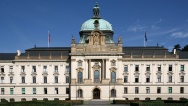Press Advisories
30. 3. 2020 22:38
Restriction of free movement, retail sale and services extended to 11 April; smart-quarantine project launched
At its teleconference session Andrej Babiš's Government again dealt predominantly with the measures relating to the SARS-CoV-2 pandemic. With respect to the epidemiological situation in the Czech Republic, which remains unfavourable, the emergency measures announced by the Ministry of Health are to remain in force until 06h00 on Saturday, 11 April. They were originally to expire on 1 April.
This means that the ban on free movement of individuals in the Czech Republic, the ban on retail sale and sale of services, the ban on operation of restaurants and other catering facilities, the order concerning the restricted operation of public authorities and administrative bodies and the other restrictions currently in force implemented by the Ministry of Health as precautionary measures against the disease spreading, will remain in force except for specific exceptions. One of the rules that is still valid, therefore, is that no more than two individuals may be together in public places. The Ministry has relaxed only the rule concerning the wearing of face masks in public: children under two years of age and drivers who are alone in their vehicle are no longer required to wear them.
The Ministers also acknowledged the other emergency measures announced by the Ministry of Health at the end of last week, which relate to the regime in social care institutions and old-age homes aiming to reduce the risk of the disease being spread among their clients. For example, homes and institutions have to set space aside exclusively for infected cases, measure clients' temperatures regularly, and cancel mass events and collective catering. It is mandatory for all new and returning clients to be tested for the presence of Coronavirus and to undergo two weeks' isolation. The currently valid emergency measures of the Ministry of Health can be found on Ministry of Health website (in Czech language).
The Government agreed to the establishment and statute of a COVID-19 Central Management Team. This team will be a new advisory body to the Government, and will be responsible for the "smart quarantine" project. The Government wants to use this modern information-technology project to search faster and more efficiently for people who could be infected with COVID-19. As of today, the project is being tested in the South Moravian Region. The Army of the Czech Republic is helping significantly with its implementation. With effect from 30 March the Government has approved the deployment of 300 soldiers into active service. They will be assisting with sample collection and other work on this project.
"During the first stage of the fight against Coronavirus, across-the-board measures were adopted to stop the virus from spreading unchecked. Fortunately, we did this quickly. It looks as though we have high a chance of levelling out the growth and the curve. We have now moved on to the second stage, which entails replacing the across-the-board measures with the smart-quarantine concept that has been used with success in Korea, Taiwan, Singapore and other countries," Prime Minister Andrej Babiš noted.
Deputy Minister of Health Roman Prymula was appointed head of the COVID-19 Central Management Team, simultaneously leaving his post as head of the Central Crisis Team. By decision of Prime Minister Andrej Babiš, Deputy Prime Minister and Minister of the Interior Jan Hamáček has been appointed head of the Central Crisis Team. For more information, see the press release (in Czech language).
The ministers also familiarised themselves with the other tax concessions prepared by the Ministry of Finance as the next stage of its liberation package. The Finance Minister wants to apply a collective value-added-tax exemption to goods that are supplied free of charge. This applies, for instance, to COVID-19 test kits and diagnostic test tools, protective clothing and similar items, thermometers, disinfectants and sterilisation products, other medical devices and medical consumables, and to commodities used in the manufacture of such items. The Ministry also wants to waive road tax appurtenances, specifically penalties for late payment of advance tax due by 15 April and 15 July, provided they are settled by 15 October 2020 at the latest.
The Ministry of the Interior has extended the ban on non-Czech nationals entering the Czech Republic until 12 April by way of a crisis measure. There are some exceptions, for example foreigners with more than 90 day's temporary residence or permanent residence, transit passengers and EU citizens married to Czech citizens. Cross-border commuters, carriers and individuals entering the country in the interests of the Czech Republic also continue to be exempted. From midnight, a fourteen-day quarantine will now be compulsory for all individuals (Czech citizens and foreigners) entering the Czech Republic, excluding exceptions. Thus, there will no longer be any differentiation between risky and non-risky countries. For more information, see the press release of the Ministry of the Interior (in Czech language).
The Government has also approved the release of a further CZK 3 billion to the Ministry of Health from the government budget reserve to secure the operational purchase of essential protective equipment and other equipment for managing Coronavirus infections, and CZK 4.316 billion to cover expenses incurred by the Ministry of the Interior in connection with the central purchase of protective equipment.
The Government has also assigned the regional council presidents and the Mayor of Prague the task of collaborating immediately with mayors of municipalities with extended competence to arrange a system of care for the homeless and individuals reported due to domestic violence who have been diagnosed with COVID-19 and were not hospitalised or were ordered to go into quarantine. Municipalities are to secure accommodation for such individuals, and they are to arrange for the operation, supply and guarding of these accommodation facilities.
The Government has also issued an order whereby all employees of critical-infrastructure entities who contribute towards the functioning of the critical infrastructure are banned from taking annual leave for the duration of the state of emergency. Individuals undergoing mandatory quarantine are the only exception. A more stringent restriction of free movement applies to such individuals during their time off, and they must, if possible, report to their employer in advance every time they leave their homes. Employers may instruct such employees to stay in a location away from their homes, but the employer must provide them with satisfactory accommodation free of charge and allow adequate contact with their families, among other things.
The ministers also approved the preparation of transport-infrastructure government contracts for maintenance, repairs and new investments. The state will spend an additional CZK 6.5 billion over and above the scope of the existing budget via the State Fund for Transport Infrastructure. The Government also decided to help firms carrying out the construction of transport and water infrastructure by way of concessions. For instance, at the proposal of the Ministry of Industry and Trade it extended the contractual deadlines for performance of these contracts.
The Minister of Transport has also been given the task of modifying the scope of the legally guaranteed scope of public transport so that it corresponds to the currently reduced passenger demand, and to modify the ticket sales method state-wide so as to curb direct contact between passengers and transport staff to the greatest extent possible. The Government made similar recommendations to the regional council presidents and the Mayor of Prague. For information about the measures pertaining to transportation, go to the Ministry of Transport website (in Czech language).
The Government also passed the emergency bill on special rules for education and decision-making at universities in 2020 and on the assessment of study periods for the purpose of further acts, which, after being passed by Parliament in a state of legislative emergency, will allow for the dates of entrance examinations, state examinations and thesis defences at universities to be shifted. It will be possible to hold distance state examinations. For more details see the press release of the Ministry of Education, Youth and Sports (in Czech language).
The Government also dealt with a number of points not directly related to the measures against Coronavirus. For example, it agreed to the Minister of Agriculture's proposal to release CZK 1.2 billion for damage caused by the bark-beetle calamity from October 2017 to the end of 2018 (for details, see the Ministry of Agriculture's press release (in Czech language), and it also approved the possibility of drawing down European Investment Bank loans for investment in the water and sanitation sector. These may amount to as much as CZK 8 billion. For more information, see the press release of the Ministry of Agriculture (in Czech language).
Useful information
- Hotline
Ministry of Transport
+420 225 131 820
Ministry of Industry nad Trade
+420 224 854 444
Ministry of Foreign Affairs
+420 224 183 200
Ministry of Interior (borders, security)
+420 739 608 533
Ministry of Education, Youth and Sports
+420 778 725 602
- Current information on Covid-19 caused by the Chinese coronavirus on the website of the Ministry of Health – information for citizens and healthcare workers, current data.
- Traveling During the State of Emergency
- The European coronavirus response team






